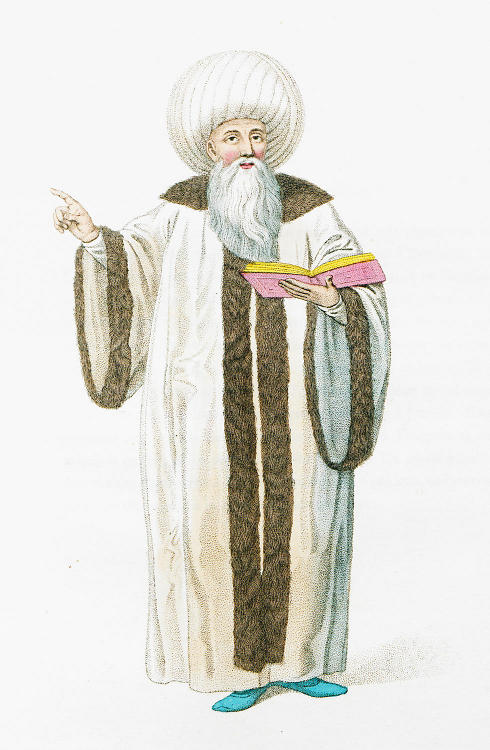COSTUME OF TURKEY, ILLUSTRATED BY A SERIES OF ENGRAVINGS; WITH DESCRIPTIONS IN ENGLISH AND FRENCH. Plate XII THE MUFTI, OR CHIEF OF RELIGION. Click for a larger image.  Previous Next The Mufti of Istanbul. In no part of the world have the ministers of religion more power than in Turkey, particularly the higher orders. In the grand Mufti, or Sheik-islam, is combined almost the supreme power of the law as well as of religion. On all questions of a doubtful nature he is consulted, even by the Sultan himself, who promulgates no law, does not declare war, or levy any tax, until it has received the Mufti’s sanction ; and his decisions are called fetfas. It is the Mufti who girds on his sabre at his coronation, reminding him at the same time of his duty to promote the welfare of religion. To counterbalance, however, this vast power of the Mufti, which would otherwise be equal to that of the Sultan, the latter is able to depose, banish, or even put the Mufti to death, should he displease him. Hence he is, too frequently, the mere slave of the Sultan. The Muftis in the different parts of the empire are all appointed by the grand Mufti, who resides at Constantinople, and they here act in a double capacity ; as expounders of the Koran, and law- but they can never be appointed judges, although they form a part of the body of Ulemas. Back to Illustrations after d'Alvimart in The Costume Of Turkey |
See a Muphti : chef de la loi musulmane Mufti, chief of the Muslim law in Monnier's album Costumes Orientaux (Recueil de costumes et vêtements de l'Empire ottoman au 18e siècle), 1786
